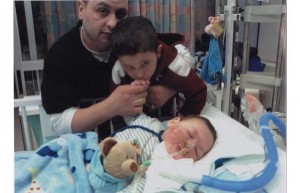 These days, both the oldest and the youngest die in hospitals.
These days, both the oldest and the youngest die in hospitals.
Baby RB suffered from a rare subtype of a genetic neuromuscular condition, congenital myasthenic syndrome, and spent his entire life – he was not yet two – on a respirator. After a protracted legal dispute between his health care providers in the UK and his parents (who disagreed on what should be done), he was allowed to die
Baby Isaiah was born with his umbilical cord wrapped around his neck after 40 hours of labor. He suffered severe and irreversible brain damage. He was kept alive for four and a half months. Following a legal dispute with health care providers in Canada, his parents agreed to allow their child to die.
The current case in the spotlight is Baby Joseph Maraachli. He suffers from a “progressively deteriorating neurological condition” of unknown origin and is in a permanent vegetative state. He is 13 months old. A court in Ontario ruled that the health center treating Baby Joseph could remove the breathing tube keeping him alive. The parents have transferred the child to a hospital in St. Louis, where he will receive a tracheotomy. The story has received extensive coverage in Canada and is just beginning to show up in the US press.
According to Reuters:
Rebecca Dresser, a professor of law and medical ethics at Washington University in St. Louis, said U.S. courts generally side with families in such cases that want to continue treatment for loved ones even in seemingly hopeless medical cases.
Dresser said similar end-of-life cases will likely become more common.
“Because of the growing concerns about costs, we’re going to see more of this,” she said.
The best place to follow stories on end-of-life issues is Thaddeus Pope’s blog, Medical Futility. Pope’s comment on Baby Joseph:
Thirteen-month-old Joseph was flown out of London, Ontario at 10:20 p.m. Sunday on a private plane. For pictures of the transfer see the Priests for Life site. Director Father Frank Pavone stated: “He needs to be in a hospital that cherishes life over the bottom line.” I am not sure this comment is fair, given the lack of evidence that the Canadian treatment and legal decisions were motivated by anything other than the best interests of Joseph.
Update 3/16/11:
Thaddeus Pope posted a reply to Rebecca Dresser’s statement that courts generally side with families.
I think that is true in only a very limited sense. Courts will order TEMPORARY injunctions to continue care until there can be a fuller development of the facts and experts. Often the patient dies in the meantime, so the TEMPORARY injunction often ends up being dispositive. But on the merits, courts have not generally sided with families. Healthcare providers are overwhelmingly successful in these cases.
Update 9/28/11:
Baby Joseph Maraachli died in his home today, according to the CBC. Thaddeus Pope comments:
As a father, I am pleased that the parents were able to get so much with their son since the Ontario courts first ruled against them in January. Still, it concerns me that two levels of court review determined that Joseph’s parents were not making appropriate decisions for him. The parents were not criminally prosecuted. Nor did they lose custody. I understand that the transfer to the United States occurred while the case was being appealed yet again (thus probably staying the lower court’s ruling). But what about protecting the best interest of the child ad litem?
Related posts:
Baby RB: Ethical dilemmas of modern medicine
Baby Isaiah May, October 24, 2009 – March 11, 2010
Baby Isaiah: February update
Baby Isaiah: Ethical dilemmas of modern medicine (2)
Baby Isaiah: Ethical dilemmas of modern medicine (1)
Resources:
Image: The Windsor Star
Canadian boy moved to US over end-of-life dispute, Reuters, March 15, 2011
Thaddeus Pope, Joseph Maraachli Transferred to St. Louis, Medical Futility Blog, March 14, 2011


Sorry, comments are closed for this post.